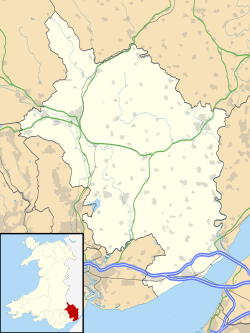History
The site selected had previously been occupied by Mount Pleasant Hospital, a facility which had been built by the Admiralty for workers at the National Shipyard in Chepstow in 1917. It was used by ex-servicemen more generally from 1919, and later by the community as a whole. The new community hospital incorporates the old Admiralty portico moulding from the front façade of the old hospital. [1] St Lawrence Hospital, an old hospital specialising in burns, had been located on the western side of St Lawrence Road. [2] [3]
The new 87-bed hospital was procured under a Private Finance Initiative in 1997. It was built by Skanska at a cost of £10 million, accepted its first patients in February 2000 and was officially opened by Rt Hon Rhodri Morgan AM MP, the First Minister of Wales in October 2000. [4] [5]
The minor injuries unit closed in November 2011. [6] In March 2013 a local councillor raised concerns that the hospital was just becoming a "glorified health centre". [7]
This page is based on this
Wikipedia article Text is available under the
CC BY-SA 4.0 license; additional terms may apply.
Images, videos and audio are available under their respective licenses.

